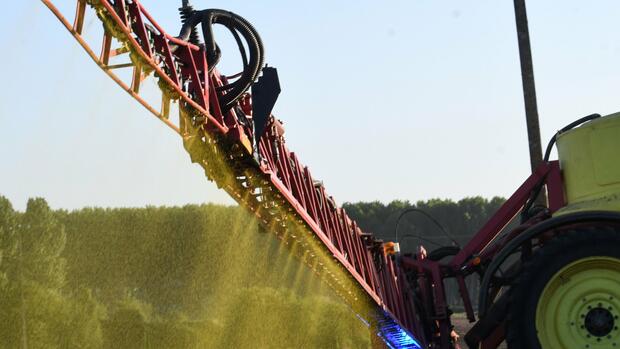The herbicide is the best-selling crop protection product worldwide.
(Photo: AFP/Getty Images)
Dusseldorf The highest EU authority for food safety (EFSA) still does not consider the weed killer glyphosate to be dangerous for humans or the environment. In the eagerly awaited new safety assessment, EFSA opposes allegations that the drug poses health risks such as cancer risks.
“EFSA has not identified any critical areas of concern in relation to the risk posed by the active substance to humans, animals or the environment,” the reassessment published on Thursday reads.
The authority is thus backing the manufacturers of the weed killer – above all the German Bayer group, which has been exposed to numerous allegations and lawsuits worth billions due to possible health risks from glyphosate.
Germany and other countries want to ban glyphosate
The group now sees its position confirmed that glyphosate does not pose a health risk to humans. The EFSA assessment is “in line with assessments by leading health authorities from around the world for almost 50 years,” the company said in a statement. Internally at Bayer there is even talk of an “acquittal”, as it is called in corporate circles.
Environmental protection organizations, on the other hand, criticize the EFSA assessment result and call for a ban on the sale of the plant protection product. They point to the damage to biodiversity caused by the weed killer.
However, renewed approval of the controversial crop protection product in the EU is now more likely. This expires in December. Many member countries, including Germany, want to ban the use of glyphosate in agriculture. However, the assessment now available brings a new situation to the ongoing process.
According to EFSA, the assessment is the result of more than three years of work by dozens of scientists from the authority and the member states. “It is based on the evaluation of many thousands of studies and scientific articles,” explained EFSA’s head of risk assessment, Guilhem de Seze.
The European Chemicals Agency had previously come to the conclusion that the active substance did not meet the scientific criteria for classification as a carcinogenic, mutagenic or toxic substance.
The Dax group is hoping for tailwinds for its glyphosate processes in the USA:
(Photo: dpa)
The two key testing authorities in the EU have thus committed themselves to not being critical of the new approval of glyphosate. The EU Commission must now draw up a recommendation for renewed licensing – based on the scientific assessments of the two institutions.
In the end, however, the member states will decide on this in the further approval process. Large countries such as France, Italy and Germany are critical of glyphosate and should ultimately decide the vote. But the governments could come under pressure after the positive risk assessment by the scientists.
“With this assessment, we will campaign in every EU country to agree to the re-authorization of the active substance glyphosate at European level,” said Bayer’s chief lobbyist Matthias Berninger of the Handelsblatt. The federal government has made a commitment: it wants to take glyphosate off the market by the end of 2023 and will not be dissuaded from this plan, as the Green-led ministries for agriculture and the environment in Berlin have already said several times.
Bayer sees a stronger legal position in the USA
For Bayer, the new risk assessment by EFSA is worth billions. This is not about the actual business: Europe accounts for less than ten percent of global glyphosate sales, which are estimated at around five billion euros. The drug is mainly sold in the USA and South America.
The EFSA classification, on the other hand, could help Bayer defend itself against glyphosate lawsuits in the United States. Because now, according to the latest information, large testing authorities in all key countries consider the active substance to be harmless. Bayer will prioritize this in upcoming lawsuits and in defending against new lawsuits. “We are convinced that the EFSA classification will also strengthen our legal position in the USA,” said Berninger.
Bayer currently has six billion euros in provisions on its balance sheet for the settlement of future glyphosate lawsuits. With growing successes, the group could possibly gradually dissolve them. Recently, Bayer has won several lawsuits in a row.
>> Read also: 7: 3 for Bayer: Why the group suddenly wins all glyphosate processes
The group had traded this legal risk with the $ 63 billion takeover of the US seed manufacturer Monsanto. The out-of-court settlement of more than 100,000 lawsuits in the United States has already cost Bayer more than ten billion dollars.
The wave of lawsuits was set in motion by the international cancer research agency IARC. In 2015, she rated glyphosate as “probably carcinogenic.” So far, no other state authority has followed this assessment.
More: EU wants to allow genetic engineering in agriculture – organic farmers are appalled.
